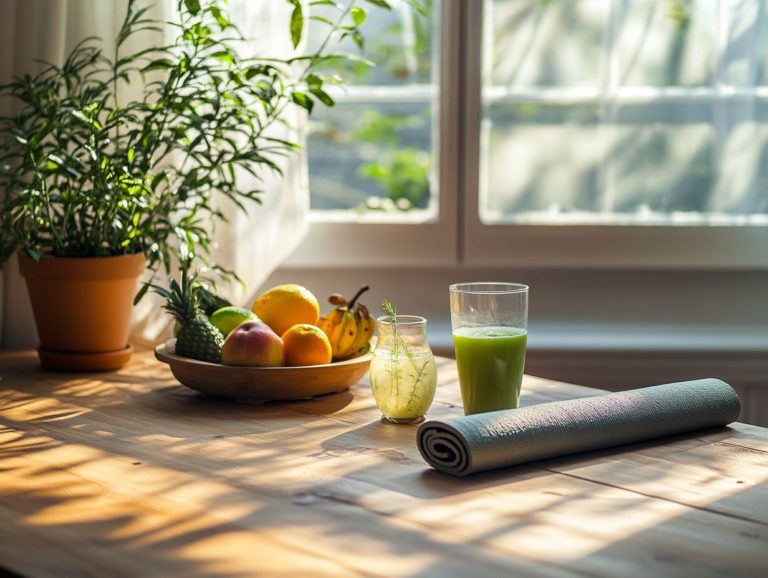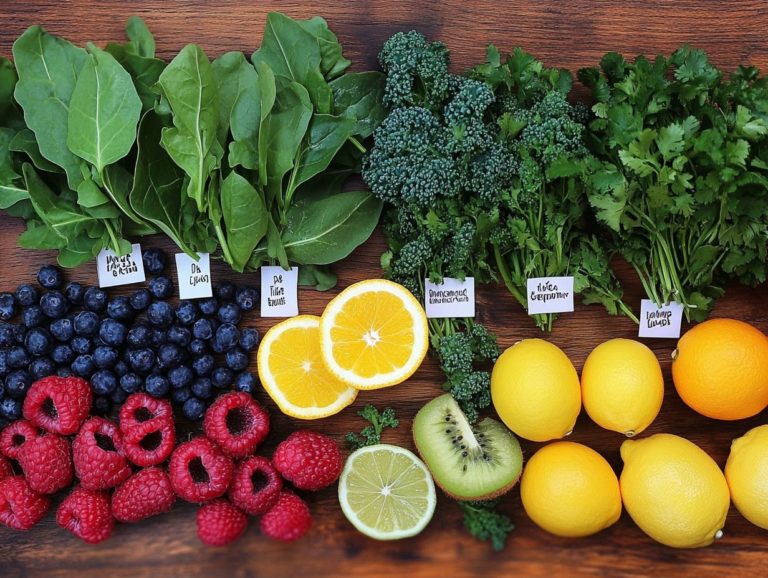Common Mistakes People Make When Detoxing
Detoxing has emerged as a prominent trend, offering the promise of cleansing the body and enhancing overall well-being.
However, many individuals embark on this journey without fully grasping the potential pitfalls. Neglecting water intake and becoming overly dependent on detox supplements can undermine your efforts and pose health risks.
Ready to transform your detox journey? Discover 15 critical mistakes to avoid for a safe and effective cleanse!
Contents
- Key Takeaways:
- 1. Not Drinking Enough Water
- 2. Focusing on Extreme Detox Diets
- 3. Not Consulting with a Healthcare Professional
- 4. Ignoring the Importance of Exercise
- 5. Not Getting Enough Sleep
- 6. Overconsumption of Detox Teas or Supplements
- 7. Not Eating Enough Nutrient-Rich Foods
- 8. Not Listening to Your Body’s Needs
- 9. Using Detox as a Quick Fix
- 10. Not Following a Balanced Diet After Detoxing
- 11. Neglecting Mental and Emotional Health
- 12. Not Considering Underlying Health Conditions
- 13. Transforming Detox into a Positive Experience
- 14. Not Staying Consistent with Detox Practices
- 15. Not Understanding the Purpose and Process of Detoxing
- Frequently Asked Questions
- What are some common mistakes people make when detoxing?
- Is it safe to do a detox without talking to a doctor or nutritionist?
- Why is it important to include essential nutrients and food groups in a detox?
- What are the potential dangers of overexercising during a detox?
- Are there any common misconceptions about detoxing?
- Want to steer clear of common detox blunders? Here s how!
Key Takeaways:

- Not drinking enough water during detox can hinder its effectiveness and cause dehydration.
- Extreme detox diets can be harmful and unsustainable in the long run.
- Consulting with a healthcare professional before detoxing is crucial, especially for those with underlying health conditions.
1. Not Drinking Enough Water
Not drinking enough water is a common pitfall on your health detox journey. It can significantly impact both the detox process and your overall health.
Hydration is crucial for your body s ability to eliminate waste, support detox pathways, and maintain energy levels. These factors enhance your natural detoxification capabilities.
Water serves as a vital vehicle for flushing out toxins, aiding your kidneys in effectively filtering waste. When you’re well-hydrated, your liver operates at peak efficiency, allowing it to process and eliminate harmful substances more effectively.
Incorporating water-rich foods like fruits and vegetables into your diet can further help maintain hydration. On the flip side, dehydration can cause detox symptoms such as headaches and fatigue, derailing your cleansing efforts.
Recognizing the importance of staying properly hydrated not only bolsters your body s detox mechanisms but also revitalizes your overall well-being.
2. Focusing on Extreme Detox Diets
Focusing on extreme detox diets, like juice fasts or crash diets, can lead to nutritional imbalances. This can cause more harm than good and create misconceptions about what a safe detox really is.
It’s far more beneficial to embrace balanced food choices that include a variety of nutrients, essential for an effective detoxification process.
When you resort to drastic measures, it s easy to overlook vital vitamins, minerals, and macronutrients. These are necessary for your body to function at its best. A deficiency can leave you feeling fatigued and weaken your immune function.
Opting for sustainable dietary choices that prioritize whole foods caters to your body s needs. It boosts your energy levels and overall vitality.
Adopting holistic detox techniques, like sipping herbal teas and enjoying fiber-rich foods, allows for a gentle cleanse. This benefits your entire system without the negative repercussions of extreme diets.
A balanced, nutrient-dense approach nurtures your well-being and steers you clear of the pitfalls often associated with quick-fix solutions.
3. Not Consulting with a Healthcare Professional
Not consulting with a healthcare professional before starting a health detox can expose you to serious health risks. Each person’s needs and conditions vary widely.
By seeking guidance from experts or professionals in functional medicine, you can ensure that your detox plan is tailored to your health requirements.
A misguided approach could worsen existing health issues or trigger unwanted reactions. Thus, personalized advice is essential.
Healthcare providers can craft a detox strategy that minimizes risks while maximizing benefits by evaluating your medical history, current medications, and lifestyle factors.
This customized plan addresses your unique health concerns and integrates vital nutrients and lifestyle adjustments. These enhance your overall well-being and guide you through a safe and effective detox journey.
Ultimately, professional input is invaluable in navigating the complexities of detoxification. This transforms what could be a risky endeavor into a structured and rewarding experience.
Let s get started on your path to a healthier you!
4. Ignoring the Importance of Exercise
Ignoring the significance of exercise during a health detox can seriously undermine your efforts. Engaging in physical activity enhances your detox pathways by boosting circulation and energy levels. It also promotes the elimination of waste products from your body.
Regular exercise supports your liver, GI tract, and the processes your body uses to convert food into energy, making it an essential part of any effective detox regimen.
Consider incorporating various forms of exercise, such as yoga, strength training, and cardiovascular workouts. This will create a well-rounded approach to detoxification. For example, yoga helps reduce stress a significant barrier to detoxification and improves flexibility while deepening breathing.
On the other hand, cardiovascular exercises like jogging or cycling stimulate perspiration, helping to expel toxins through your skin. By complementing dietary changes with a consistent exercise routine, you will amplify the benefits of detoxification. This will enhance your energy levels, mental clarity, and overall vitality as your body strives to restore balance.
5. Not Getting Enough Sleep
Not prioritizing sleep during a health detox is a significant oversight. Restorative sleep is crucial for reaping the full benefits of detoxification. It helps regulate your body’s natural detox mechanisms. Quality sleep supports optimal energy levels and enhances cognitive function. It also fosters a positive mindset all essential components of an effective cleansing regimen.
When your sleep is compromised, your body struggles to carry out its vital detox functions. This can lead to intensified symptoms like fatigue, headaches, and irritability. Such disruption can impede your liver’s ability to process toxins and waste effectively.
To counteract these effects, you need to establish a consistent sleep schedule. This will make your detox experience much better! Incorporating relaxation techniques such as meditation or gentle yoga before bedtime can significantly improve your sleep hygiene.
Creating a calming sleep environment by minimizing exposure to screens and noise will help align your sleep patterns with your detox efforts. This paves the way for improved health outcomes and a revitalized body.
6. Overconsumption of Detox Teas or Supplements
Overconsumption of detox teas or supplements often leads to common pitfalls in the detox process. It can potentially cause more harm than good, resulting in various health issues. While some detox drinks may offer nutritional support, you must approach them with moderation and an understanding of their effects on your body.
Relying too heavily on these products can create a dependency. This makes it difficult for you to achieve a natural detox on your own. Excessive use might lead to nutrient imbalances, as these supplements often lack a comprehensive array of vitamins and minerals necessary for your well-being.
It s important to integrate detox teas into a holistic detox plan one that emphasizes balanced nutrition, proper hydration, and regular exercise. By doing this, you can enjoy the potential benefits of detox products without becoming overly reliant on them. This paves the way for a healthier, more sustainable approach to detoxification.
7. Not Eating Enough Nutrient-Rich Foods
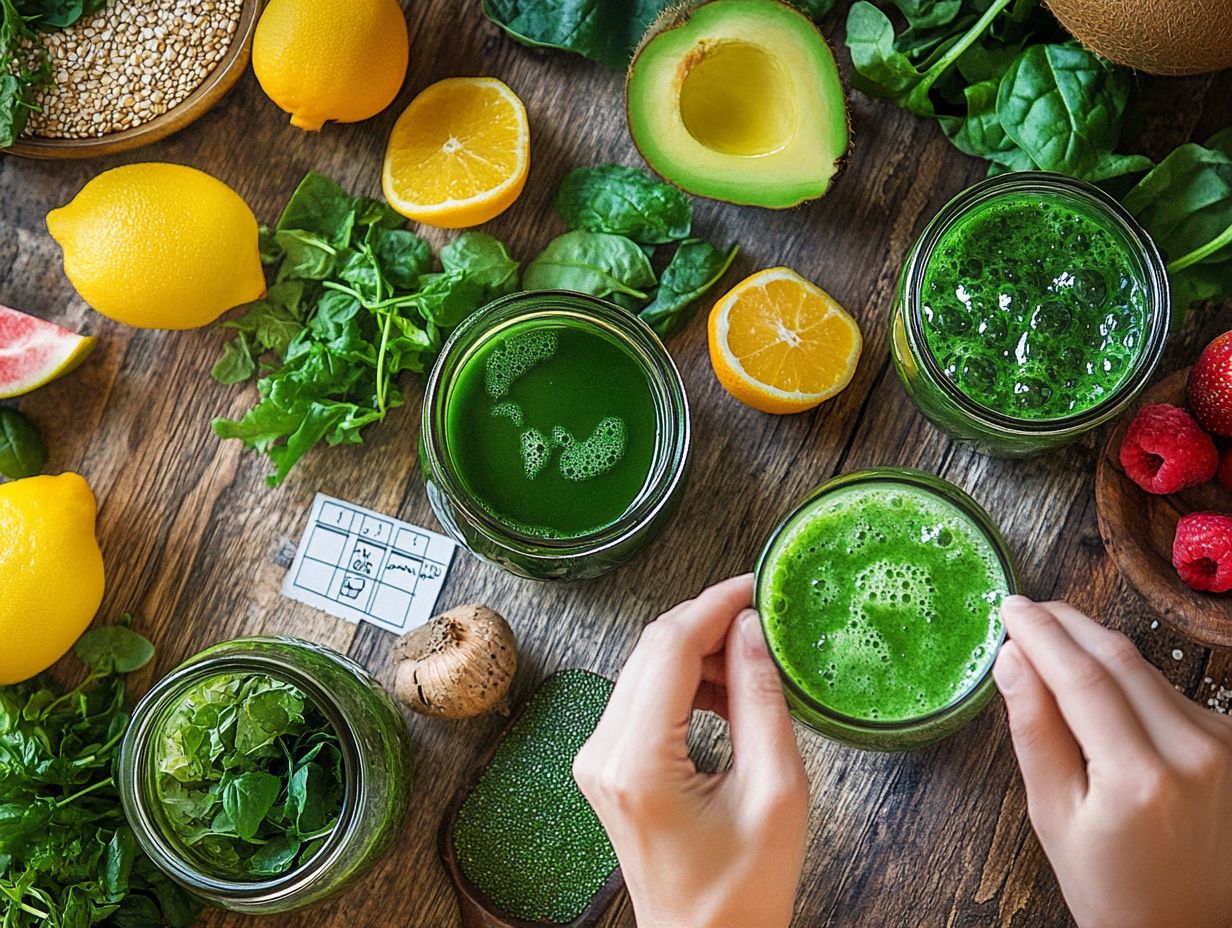
Not eating enough nutrient-rich foods is a common misstep that can significantly undermine the effectiveness of any health detox. These nutrient-dense foods are essential for supporting your body s natural detoxification processes (the body’s process of eliminating toxins) and maintaining overall well-being.
By incorporating a diverse array of fruits, vegetables, and whole foods into your diet, you ensure that you’re getting adequate vitamins, minerals, and dietary fiber to facilitate the detox process.
Every food group plays a unique role in your detoxification journey. For example, leafy greens like spinach and kale are brimming with chlorophyll, which helps remove toxins from the blood. Citrus fruits are loaded with vitamin C, crucial for assisting the liver in breaking down harmful substances. Whole grains like quinoa and brown rice provide the necessary fiber that promotes regular digestion and effective waste elimination.
Don t forget about legumes like lentils and chickpeas; they offer plant-based protein while also supporting gut health. Integrating these nutrient-rich foods into your daily meals enhances your body s natural ability to detoxify and maintain optimal health.
8. Not Listening to Your Body’s Needs
Neglecting to listen to your body’s needs during a health detox can lead to behaviors that can harm your progress and intensify detox symptoms, thwarting your efforts to achieve the results you desire. Pay attention to what your body is telling you it can guide your journey.
By tuning into these signals, you can make more informed food choices, discovering which foods truly nourish you and which may hold you back. This awareness helps you connect more deeply with yourself, paving the way for a more intuitive approach to wellness.
Flexibility in your detox plan is essential. As your body responds to various foods and practices, being adaptable enhances your experience. If something doesn t feel right, adjusting your diet or routine without guilt opens the door to a more supportive and sustainable detox journey, ultimately leading to lasting health benefits.
9. Using Detox as a Quick Fix
Using detox as a quick fix is a common misconception that undermines the true purpose of health detoxification, leading to unsustainable practices like crash diets that can actually harm your body. A successful detox is a gradual journey that prioritizes your long-term health over fleeting results.
Unlike fleeting solutions that promise rapid weight loss or instant purification, a well-structured detox plan emphasizes the importance of consistency and sustainable lifestyle changes. This approach allows your body to adapt naturally, helping you cultivate healthier habits that support your overall well-being.
By focusing on steady progress, you can experience improved energy levels, a stronger immune system, and enhanced mental clarity over time. In contrast, the risks associated with rapid detox methods can lead to nutritional deficiencies, metabolic imbalances, and emotional distress, ultimately derailing your chances of achieving lasting health improvements.
10. Not Following a Balanced Diet After Detoxing
You must keep your diet diverse and packed with nutrients to maintain your gains! Not following a balanced diet after detoxing can easily undo the progress you’ve made, potentially leading to health issues and allowing toxic compounds to creep back into your body.
To achieve this, prioritize whole foods over processed options, filling your meals with an abundance of fruits, vegetables, and whole grains. Practicing portion control is equally important; ensure that any indulgences are balanced with nutrient-dense choices. Embrace a variety of food groups to provide your body with essential vitamins and minerals while keeping your meals fresh and exciting.
Don’t overlook hydration drinking plenty of water is key to aiding digestion and flushing out any lingering toxins. Thoughtful food selections will not only help you sustain the positive effects of detox but also enhance your overall well-being and vitality.
11. Neglecting Mental and Emotional Health
Neglecting your mental and emotional health during a health detox can lead to self-sabotaging behaviors that undermine your efforts and counteract the intended benefits. Cultivating a positive mindset is essential for navigating the emotional challenges that may arise during this journey. This ultimately helps you achieve lasting results.
Recognize that your detox journey encompasses both psychological wellness and physical health. This understanding provides the necessary support for sustained change. Incorporating daily practices like mindfulness, meditation, or journaling allows you to process your feelings and track your progress key elements for maintaining motivation.
Seek support from friends, family, or a therapist to enhance your resilience. Sharing your experiences alleviates feelings of isolation and creates a stronger support network. Set realistic goals and celebrate small victories to reinforce your sense of achievement, keeping you committed to your detox path.
12. Not Considering Underlying Health Conditions
Not considering your underlying health conditions when planning a detox can lead to misunderstandings and practices that might worsen existing issues. Approaching detoxification with care can transform your health journey! Tailor your detox plan to meet your unique health needs for optimal safety and effectiveness.
Consult with healthcare professionals; they can provide insights into specific conditions needing special attention during your detox journey. A personalized detox strategy, crafted with expert guidance, minimizes risks and enhances your overall health outcomes by targeting specific ailments or imbalances.
Whether you’re addressing concerns like digestive health, hormonal imbalances, or autoimmune issues, a customized detox plan offers a holistic approach. This ensures your body is well-supported throughout the cleansing process. By prioritizing your individual health conditions, you can pave a sustainable path toward improved wellness and vitality.
13. Transforming Detox into a Positive Experience
Using detox as a way to punish yourself for unhealthy habits can lead to self-sabotaging behaviors and reinforce negative attitudes toward food and health. This ultimately undermines the very purpose of a health detox. Embrace a positive mindset instead of viewing detox as self-discipline; this is crucial for achieving lasting health benefits and maintaining balance in your lifestyle.
Reframe detoxification as an opportunity for personal growth, which can lead to more sustainable outcomes. This perspective encourages you to focus on nourishing your body rather than simply depriving it. Set realistic goals, celebrate small victories, and understand that the journey to better health is a gradual process, not a quick fix.
Incorporate mindful eating practices and enjoyable physical activities into your daily routine to enhance this transformative journey. Ultimately, viewing detox as a holistic experience promotes a healthier, more positive relationship with both food and wellness.
14. Not Staying Consistent with Detox Practices
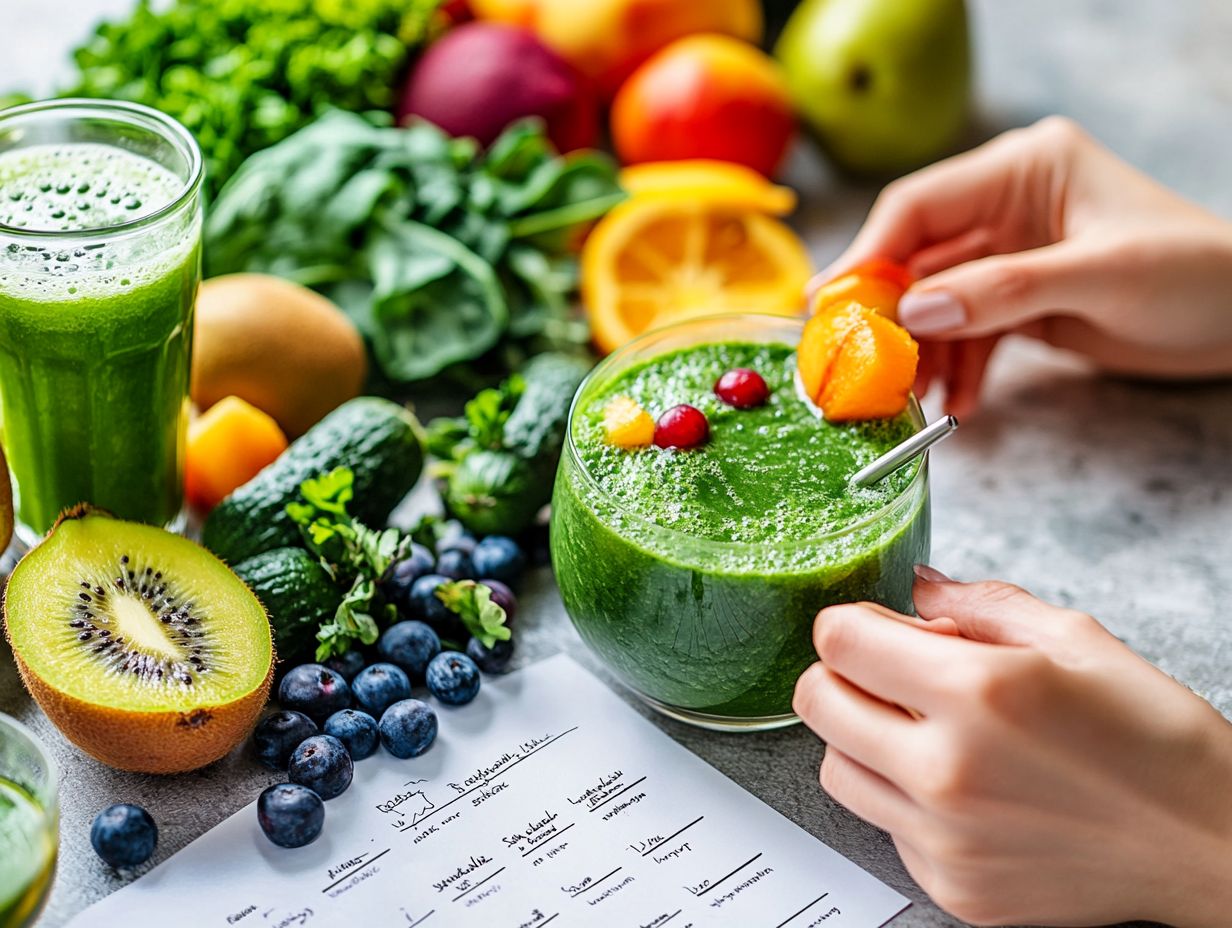
Staying consistent with your detox practices is essential for success. Inconsistency can lead to unwanted symptoms and slow your progress toward health goals.
To create a sustainable routine, plan carefully and commit to your regimen. Consider various detox techniques, such as:
- Diet changes
- Drinking enough water
- Mindful activities that support your well-being
Boost your motivation by setting small, achievable goals. Journaling or sharing with a supportive community can provide a sense of accomplishment.
Having accountability partners can help keep you on track. They offer encouragement and gentle reminders to stick to your detox plan.
By fostering a consistent mindset, you enhance your chances of enjoying immediate and lasting health improvements.
15. Not Understanding the Purpose and Process of Detoxing
Not understanding detoxing can lead to misconceptions about health. Knowing what detoxing is will help set realistic expectations and support your health journey.
The detox process happens in three phases. It begins with changing fat-soluble toxins into water-soluble compounds for elimination.
In phase one, enzymes modify toxins. Phase two, called conjugation, makes these substances less harmful by adding molecules. Finally, in phase three, your body removes these harmless wastes through urine, bile, or feces.
Educating yourself about these stages empowers you to build healthier habits. It helps you avoid extreme diets or unverified supplements that disrupt your body.
What Are the Benefits of Detoxing the Right Way?
Detoxing correctly offers many benefits, including more energy, better mental clarity, and improved health. Using proper detox techniques helps your body remove harmful substances and rejuvenates your vital organs.
Effective detoxing can lead to visible changes like clearer skin and better digestion. Many find that adding detox practices to their routines lifts their mood and gives them renewed energy.
For example, drinking more water and enjoying antioxidant-rich foods can strengthen your immune system. Clearing mental clutter through meditation during detox can enhance your emotional resilience.
This holistic approach promotes lasting health and enriches your quality of life.
What Are the Possible Side Effects of Improper Detoxing?
Improper detoxing can lead to a host of negative side effects, such as fatigue, headaches, and digestive issues. These effects may worsen any existing health concerns. Understanding the risks and misconceptions tied to crash diets and extreme detox methods is key to ensuring a safe and effective detox experience.
Many people overlook the significance of a gradual approach. This method can help you avoid adverse reactions. When your body faces sudden changes, you might notice signs like irritability, skin breakouts, and mood swings. These could indicate that your current method isn t quite right for you.
Pay close attention to these symptoms and be ready to adjust your habits as needed. This could mean incorporating more whole foods, staying well-hydrated, or simply giving your body time to adapt. Recognizing when detox practices cause discomfort empowers you to take a more balanced approach, leading to a healthier and more sustainable journey toward wellness.
How Can One Incorporate Healthy Detox Practices into Their Daily Life?
Incorporating healthy detox practices into your daily life can be achieved with a few simple changes in your food choices, hydration, and lifestyle habits. These promote a gentle detox without overwhelming your system. By emphasizing a positive mindset and integrating detox drinks along with nutrient-rich foods, you can create a sustainable approach to maintaining optimal health.
One effective strategy is meal planning. This allows you to prioritize fresh fruits and vegetables while minimizing your intake of processed foods that are laden with toxins. Keeping a water bottle within reach fosters hydration habits, which are essential for flushing out impurities from your system.
Regular physical activity, even if it s just short bursts throughout the day, can significantly support your detox process. By focusing on these small but impactful adjustments, you can cultivate a wellness routine that feels manageable and leads to meaningful improvements in your overall health over time.
What Are Some Alternative Ways to Detox?
Exploring alternative ways to detox can elevate your experience, providing invaluable support for your body s natural detox processes. Delving into various detox techniques, functional medicine, and holistic approaches ensures a safe and effective detox journey. You may want to include healthy fats, probiotics (good bacteria that help your gut), and nutrient-dense foods in your diet to enhance this experience.
You can also make dietary adjustments. For example, increasing your fiber intake through whole grains and fruits can facilitate regular bowel movements and assist your body s detox efforts. Herbal remedies like milk thistle or dandelion root significantly boost liver function and promote toxin elimination.
Embracing lifestyle changes, such as regular exercise, adequate hydration, and mindfulness practices, can enrich your detox experience. When these methods combine, they seamlessly complement traditional detox practices. This creates a well-rounded approach that encourages the expulsion of harmful substances while nurturing your overall well-being.
Is Detoxing Safe for Everyone?
Detoxing isn’t a one-size-fits-all solution. Certain underlying health conditions can create risks that require personalized detox approaches tailored to your unique health needs. Understanding the misconceptions surrounding detoxing helps you determine if it’s suitable for your specific situation.
Key factors like chronic illnesses, allergies, and current medications significantly influence how your body may respond to detox processes. For example, if you have liver disease, a detox regimen could potentially complicate matters by putting additional strain on your liver.
The interactions between detox supplements and prescription medications may also lead to adverse effects, highlighting the necessity of individualized care. If you’re contemplating a detox, consulting healthcare professionals is crucial.
Tailored plans not only ensure your safety but also enhance effectiveness. This allows you to embark on a healthier lifestyle while prioritizing your overall well-being.
Watch this video to learn more about safe detox practices!
Don’t wait start incorporating these healthy habits today for a better tomorrow! Share your detox experiences or consult a professional for personalized advice.
Frequently Asked Questions
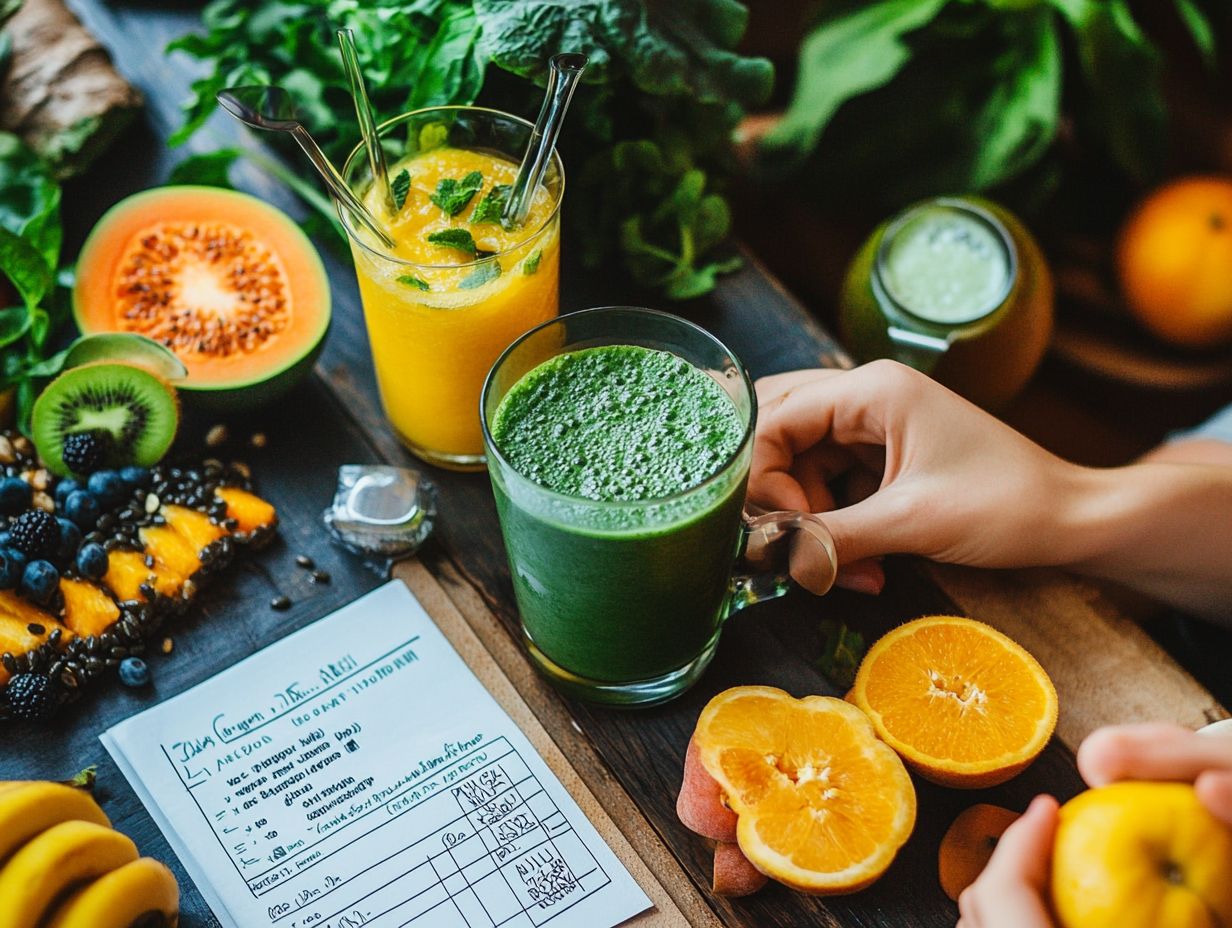
Detoxing can be a journey, and we know you might have questions. Here are some answers to help you along the way!
What are some common mistakes people make when detoxing?
Some common mistakes include cutting out essential nutrients, overexercising, and not talking to a doctor or nutritionist before starting a detox plan.
Is it safe to do a detox without talking to a doctor or nutritionist?
No, it is not recommended to do a detox without first talking to a doctor or nutritionist. They can help you create a safe and effective plan tailored to your needs.
Why is it important to include essential nutrients and food groups in a detox?
Essential nutrients provide the body with necessary fuel and support to function properly, even during a detox. Cutting them out can lead to nutrient deficiencies and other health issues.
What are the potential dangers of overexercising during a detox?
Overexercising can strain the body, potentially leading to dehydration, fatigue, and injury. Listen to your body to avoid overexertion.
Are there any common misconceptions about detoxing?
Yes, many believe detoxing is a quick fix for weight loss or can cure illnesses. Detoxing should instead support your body’s natural detoxification processes. Detoxing can be a fantastic way to boost your health just make sure you do it right!
Want to steer clear of common detox blunders? Here s how!
To avoid common mistakes, it’s important to do your research, talk to a doctor or nutritionist, and listen to your body. Set realistic goals and expectations for your detox journey.




